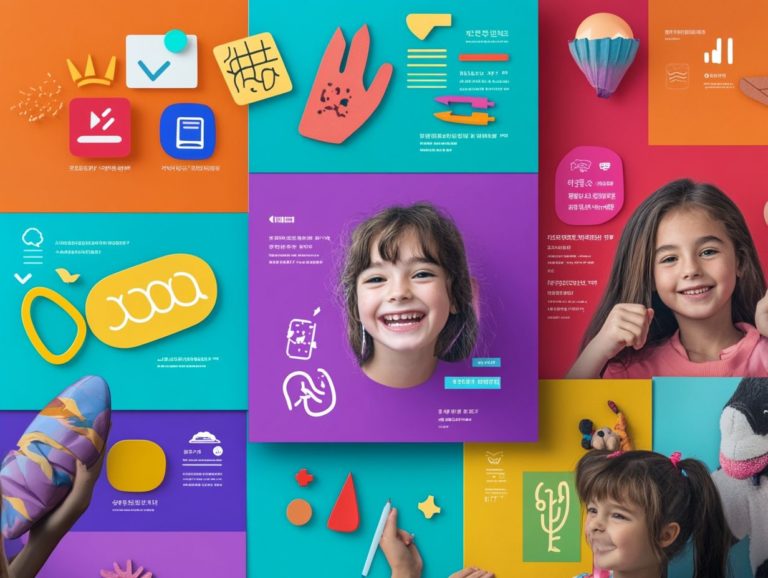5 Things to Avoid When Learning a New Language
Learning a new language is an exciting journey, yet it s all too easy to stumble along the way.
Many learners often find themselves ensnared in common traps that can impede their progress. From overlooking essential basics to fixating solely on grammar, these pitfalls can make the process feel daunting and overwhelming.
This article delves into five key mistakes to avoid, emphasizes the significance of surrounding yourself with the culture of the language you’re learning, and offers valuable tips to help you navigate challenges.
Whether you re just embarking on this adventure or seeking to refine your skills, grasping these missteps can keep you motivated and elevate your language-learning experience to new heights!
Contents
Key Takeaways:

Begin with the basics: Skipping the fundamentals can hinder your progress in learning a new language. Focus on building a strong foundation to ensure a smoother learning experience!
Grammar is important, but not everything: Don’t get too caught up in grammar. Language is about communication, so practice speaking and listening to truly master a new language!
Don’t compare yourself to native speakers: Everyone learns at their own pace. Instead, focus on your own progress and celebrate your achievements!
1. Skipping the Basics
Skipping the basics in language learning can significantly hinder your progress. Foundational knowledge is essential for mastering a foreign language. Without it, you may find yourself grappling with grammar, vocabulary, and effective communication.
This oversight can lead to frustration and common mistakes that could easily be avoided with a solid understanding of the essentials. For instance, you might misuse verb tenses or confuse similar-sounding words, negatively impacting both your writing and speaking skills.
These foundational errors can lead to misunderstandings in conversations, making it challenging for you to convey your thoughts clearly. When you neglect those basic building blocks, you create a shaky framework that complicates your future learning.
By investing time in mastering grammar and vocabulary early on, you enhance your ability to interact meaningfully and express yourself with confidence! This paves the way for more advanced language acquisition as you progress.
2. Focusing Only on Grammar
While grammar plays a pivotal role in language learning, fixating solely on it can stifle the development of your speaking skills and impede your ability to communicate effectively in real-life situations. This can lead to misunderstandings and costly mistakes.
To truly master a language, it s essential to weave speaking and listening practice into your grammar studies. Practical communication requires much more than just an understanding of the rules; it demands the agility to think on your feet, respond aptly, and convey your ideas with clarity.
Finding the right balance between mastering grammar and honing these practical skills is crucial. Engaging with authentic materials through various media can help you achieve this balance, immersing you in the language’s nuances!
By embracing this approach, you not only refine your grammatical accuracy but also bolster your confidence and fluency in real-world interactions.
3. Not Practicing Speaking and Listening Enough

Neglecting to practice speaking and listening can create a significant barrier for language learners, as these skills are essential for achieving fluency and fostering effective communication in a foreign language.
To overcome this challenge, immersing yourself in practical exercises is crucial. Engaging in language exchange programs offers invaluable opportunities to interact with native speakers, enhancing both your comprehension and pronunciation skills!
Consuming media such as films and podcasts allows you to hear authentic language usage, varied accents, and cultural nuances, further reinforcing your understanding. These activities not only make the learning process enjoyable but also help build your confidence and proficiency, ultimately paving the way for more natural conversations and deeper cultural connections.
4. Comparing Yourself to Native Speakers
Comparing yourself to native speakers can hinder your language learning journey, often leading to frustration. Embracing your own progress with patience and persistence is essential for overcoming this common pitfall.
Instead of fixating on perceived shortcomings, celebrate your unique achievements, no matter how small. Remember that learning a language is a gradual journey.
Focusing on personal benchmarks, like preparing for the C1 test, can provide motivation and a clearer path forward. Even native speakers had to learn their language step by step, just as you are doing now.
Cultivating a positive mindset and setting realistic goals will create a more enjoyable and effective learning experience for you. Start celebrating your progress today!
5. Not Immersing Yourself in the Culture
Failing to immerse yourself in the culture of a foreign language can greatly limit your understanding.
Cultural nuances play a vital role in enhancing language learning through authentic materials and experiences. Engaging directly with native speakers whether through conversation exchanges or language classes opens doors to real-world applications of vocabulary and idioms that textbooks often overlook.
Consuming films, music, and TV shows in the target language can deepen your understanding, allowing you to catch colloquial expressions and emotional tones essential for fluency.
Utilizing language resources that spotlight cultural aspects like cookbooks featuring regional cuisines or travel blogs exploring local customs provides you with a holistic view of daily life.
Engaging in this approach will supercharge your vocabulary! It will also significantly improve your communication skills, making your interactions more meaningful and enjoyable.
Why Is It Important to Avoid These Mistakes?

Avoiding common mistakes in language learning is essential for ensuring effective progress and enhancing your communication skills. To accelerate your journey, consider exploring 5 ways to improve your language skills quickly. Each misstep creates barriers that impede fluency and understanding, making it crucial to identify and address these pitfalls early on.
If you frequently make grammatical errors, misunderstandings can arise where your intended message gets lost or misconstrued. This hampers your ability to communicate and can lead to discouragement that affects your motivation and confidence.
Research shows that 70% of learners struggle to remember basics when foundational concepts are overlooked.
On the flip side, adopting correct strategies can significantly bolster your fluency. Those who practice regularly see a remarkable 50% improvement in conversational skills within a year.
How Can One Overcome These Challenges?
Overcoming challenges in language learning demands a proactive mindset. Embrace mistakes as opportunities for growth, and you will discover patterns that can boost your proficiency.
You can adopt a multifaceted approach. This means not just frequent speaking and listening exercises, but also tapping into various resources, such as language exchange partners and apps designed to enhance vocabulary retention.
By analyzing the errors you make during conversations or written exercises, you can turn each misstep into a valuable lesson. Setting aside regular time for practice through engaging activities like reading and watching films in your target language will solidify your understanding.
This immersive engagement, combined with techniques that promote active recall (which means actively retrieving information from memory), ensures that the knowledge you acquire becomes truly ingrained. Start your journey to fluency today!
What Are the Benefits of Learning a New Language?
Learning a new language brings many benefits. It expands your vocabulary and sharpens your communication skills.
This journey also gives you a better understanding of the world around you. You ll gain a deeper appreciation for different cultures linked to language, tradition, literature, and social practices.
For instance, studying Spanish allows you to explore Latin culture through music and dance. These experiences can be both enriching and enjoyable.
Speaking another language can boost your career prospects. It opens doors in fields like diplomacy, international business, and education.
Cognitive benefits also appear in daily life. Studies show bilingual individuals often have better problem-solving skills and creativity.
Ultimately, learning a new language not only provides practical skills but also enriches your personal growth and relationships.
How Can One Stay Motivated While Learning a New Language?

Staying motivated is essential for your long-term success. Language learning demands patience, persistence, and effective progress tracking.
Set realistic goals to break your journey into manageable parts. This makes your learning feel less daunting and much more achievable.
Celebrate small victories! Whether it’s mastering vocabulary or holding a conversation, these moments can significantly boost your morale.
Use enjoyable resources like music, podcasts, or language games. These make learning fun instead of purely academic.
Connect with a community of fellow learners. Their support can inspire you and create an enriching environment for shared experiences.
What Are the Common Myths About Learning a New Language?
Many myths about language learning can mislead you. For example, some believe you can achieve fluency without making mistakes, or that fluency comes in just a few weeks.
These misconceptions can create unnecessary pressure. In reality, making mistakes is normal and essential for growth.
Research shows that errors enhance learning. When you mispronounce a word, feedback helps you remember it correctly.
By accepting the realities of language learning, you cultivate a positive mindset. View challenges as opportunities to improve and enjoy your journey toward fluency.
How Can One Utilize Technology to Aid in Language Learning?
Technology can greatly enhance your language learning experience. It provides access to online tutors and popular apps like Duolingo and Babbel.
These tools enhance accessibility and allow you to study at your own pace. You can fit lessons into your busy schedule.
Choose tools that match your learning style. Whether you prefer interactive exercises, visual aids, or auditory lessons, there s something for everyone.
This variety helps you engage with the language more deeply, leading to a stronger understanding.
Many options also include community features. These let you connect with other learners and gain unique cultural insights, enriching your overall journey.






